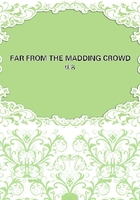
第30章
Outside the Barracks - Snow - A Meeting
For dreariness nothing could surpass a prospect in the outskirts of a certain town and military station, many miles north of Weatherbury at a later hour on this same snowy evening - if that may be called a prospect of which the chief constituent was darkness.
It was a night when sorrow may come to the brightest without causing any great sense of incongruity: when, with impressible persons, love becomes solicitousness, hope sinks to misgiving, and faith to hope: when the exercise of memory does not stir feelings of regret at opportunities for ambition that have been passed by, and anticipation does not prompt to enterprise.
The scene was a public path, bordered on the left hand by a river, behind which rose a high wall. On the right was a tract of land, partly meadow and partly moor, reaching, at its remote verge, to a wide undulating upland.
The changes of the seasons are less obtrusive on spots of this kind than amid woodland scenery. Still, to a close observer, they are just as perceptible; the difference is that their media of manifestation are less trite and familiar than such well-known ones as the bursting of the buds or the fall of the leaf. Many are not so stealthy and gradual as we may be apt to imagine in considering the general torpidity of a moor or waste.
Winter, in coming to the country hereabout, advanced in well-marked stages, wherein might have been successively observed the retreat of the snakes.
The transformation of the ferns, the filling of the pools, a rising of fogs, the embrowning by frost, the collapse of the fungi, and an obliteration by snow.
This climax of the series had been reached tonight on the aforesaid moor, and for the first time in the season its irregularities were forms without features; suggestive of anything, proclaiming nothing, and without more character than that of being the limit of something else - the lowest layer of a firmament of snow. From this chaotic skyful of crowding flakes the mead and moor momentarily received additional clothing, only to appear momentarily more naked thereby. The vast arch of cloud above was strangely low, and formed as it were the roof of a large dark cavern, gradually sinking in upon its floor; for the instinctive thought was that the snow lining the heavens and that encrusting the earth would soon unite into one mass without any intervening stratum of air at all.
We turn our attention to the left-hand characteristics; which were flatness in respect of the river, verticality in respect of the wall behind it, and darkness as to both. These features made up the mass. If anything could be darker than the sky, it was the wall, and if anything could be gloomier than the wall it was the river beneath. The indistinct summit of the facade was notched and prolonged by chimneys here and there, and upon its face were faintly signified the oblong shapes of windows, though only in the upper part. Below, down to the water's edge, the flat was unbroken by hole or projection.
An indescribable succession of dull blows, perplexing in their regularity, sent their sound with difficulty through the fluffy atmosphere. It was a neighbouring clock striking ten. The bell was in the open air, and being overlaid with several inches of muffing snow, had lost its voice for the time.
About this hour the snow abated: ten flakes fell where twenty had fallen, then one had the room of ten. Not long after a form moved by the brink of the river.
By its outline upon the colourless background a close observer might have seen that it was small. This was all that was positively discoverable, though it seemed human.
The shape went slowly along, but without much exertion, for the snow, though sudden, was not as yet more than two inches deep. At this time some words were spoken aloud:--`One. Two. Three. Four. Five.'
Between each utterance the little shape advanced about half-a-dozen yards. It was evident now that the windows high in the wall were being counted. The word `Five' represented the fifth window from the end of the wall.
Here the spot stopped, and dwindled smaller. The figure was stooping.